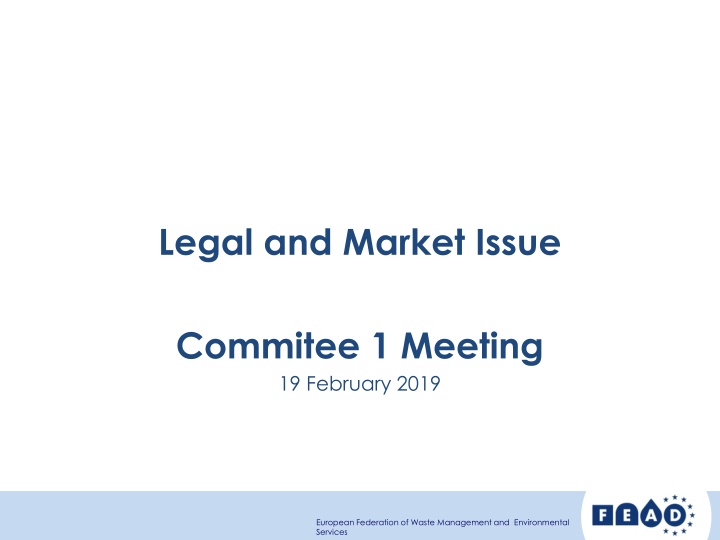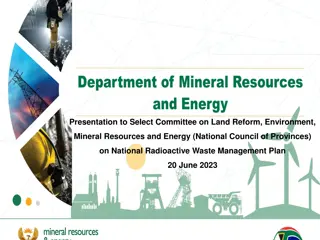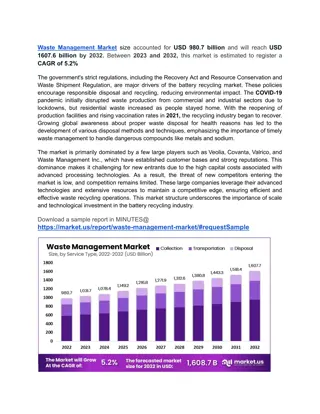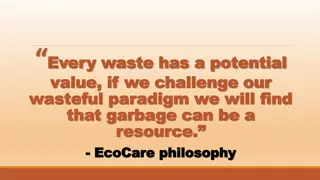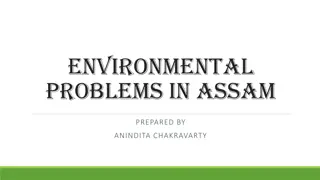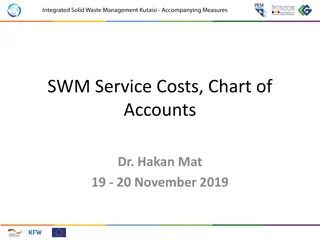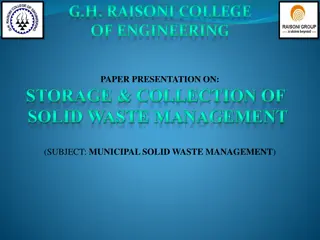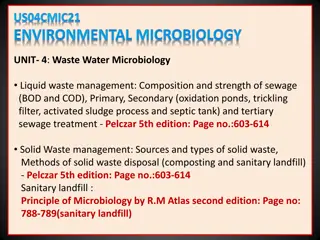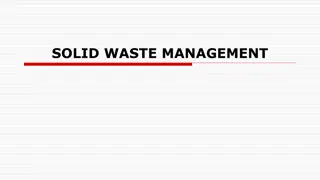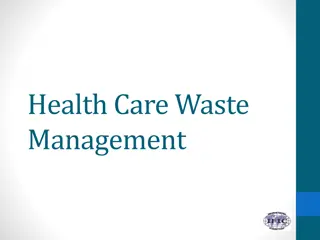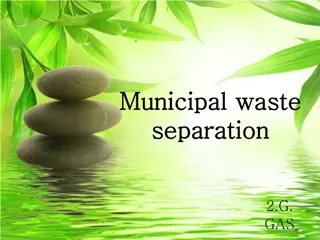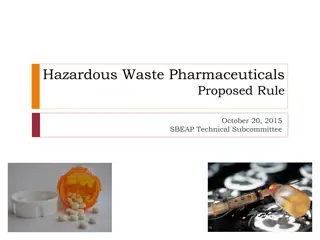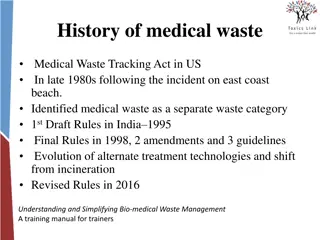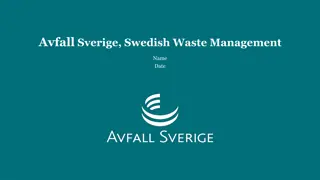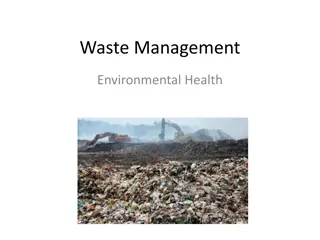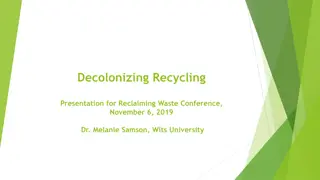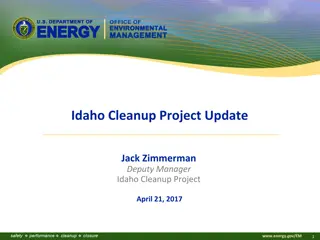Municipal Waste Definition Implementation Study
Guidelines for defining municipal waste, exploring implementation challenges, and distinguishing between waste types in European countries. Member states share examples, concerns, and compositions of municipal waste.
Download Presentation

Please find below an Image/Link to download the presentation.
The content on the website is provided AS IS for your information and personal use only. It may not be sold, licensed, or shared on other websites without obtaining consent from the author.If you encounter any issues during the download, it is possible that the publisher has removed the file from their server.
You are allowed to download the files provided on this website for personal or commercial use, subject to the condition that they are used lawfully. All files are the property of their respective owners.
The content on the website is provided AS IS for your information and personal use only. It may not be sold, licensed, or shared on other websites without obtaining consent from the author.
E N D
Presentation Transcript
Legal and Market Issue Commitee 1 Meeting 19 February 2019 European Federation of Waste Management and Environmental Services
Guidelines on the definition of municipal waste In a joint effort with Committee 2, we are trying to prepare some input in view of the European Commission s study (normally, it should start from April 2019). So far, FEAD Secretariat is trying to prepare a document including these 3 elements: concrete examples of how the municipal waste definition (definition from the old framework directive from 2008) has been implemented in each Member State. For instance, if the national members observed situations of unfair competition with municipalities because of the implementation of this definition? breakdown of the composition of municipal waste, by percentage, in each country or big city how municipal waste and other types of waste are distinguished from one another in each country European Federation of Waste Management and Environmental Services
Guidelines on the definition of municipal waste The Commission should start its study by April 2019. As agreed with Committee 1, we asked 3 questions to the members: 1) Could you provide us with some concrete examples of how the municipal waste definition (definition from the old framework directive from 2008) has been implemented in your country? For instance, did you observe situations of unfair competition with municipalities because of the implementation of this definition? 2) We are looking for some information on how municipal waste and other types of waste are distinguished from one another in your country. > See table 1 for both questions (the answer to the question 2 is underlined in the table) 3) Could you please provide a breakdown of the composition of municipal waste, by percentage, in your country or big cities? For example, what percentage is made up of biowaste, glass, paper etc.. For instance, the answer could be: in the city xxxxxx and in general, municipal waste is composed of paper (25%), biowaste (15%), glass (5%), paper/board (10%), plastics (10%), etc > See table 2 FEAD Secretariat need your feedback and approval on tables 1 and 2 European Federation of Waste Management and Environmental Services
Table 1: Definition of Municipal Waste, distinction with other types of waste (underlined in the table) and unfair competition Member State Definition of Municipal Waste Unfair Competition / Other Issues Ireland Household and commercial wastes which are collected in a similar manner to household waste, are all considered to be municipal wastes. No unfair competition is caused by the definition. There have been problems with the implementation of the definition in Finland; causing municipal waste management companies and the private sector for construction and demolition waste. Finland The definition makes a distinction between municipal waste and waste that is municipal responsibility. The latter is managed by municipal waste management companies, while the rest is collected and managed by the private sector. competition between Depending on the origin of the waste, i.e. where it comes from, it is assigned a code. This code is how municipal waste and other types are distinguished from one another in Finland. ???? In Norway the term municipal waste is not used. They instead distinguish between household and commercial waste. What is the criteria to distinguish between "household waste" and "commercial waste"? Norway European Federation of Waste Management and Environmental Services
Table 1: Definition of Municipal Waste, distinction with other types of waste (underlined in the table) and unfair competition Member State Definition of Municipal Waste Unfair Competition / Other Issues Federal Austrian law defines municipal waste as waste mainly produced by households, though similar compound wastes from other sources are included . Austria However, individual state definitions deviate from this and some oblige people to have their waste treated through the municipality. This leaves little room for private waste management companies and impedes free competition. In Romanian law the definition of municipal waste is: (a) waste from households, (b) waste from other sources where the waste is similar in nature and composition to household waste. There is unfair competition with municipalities. Romania As the definition covers multiple sources of generation and categories of waste, unfair competition is visible between municipality sanitation companies and private collectors. Municipal agriculture, forestry, fishing, septic tanks and sewerage and treatment networks, including sewage sludge, end-of-life vehicles, and construction and demolition waste. waste does not include production waste, The new legislation will come into force in 2019. Currently, there are no lists or guides to distinguish between different types of waste and in particular to distinguish between types of waste that compose municipal waste. The distinction is left at the hand of the operator who transmits to the authorities and is guided only by definitions that are not very precise to distinguishdifferenttypes of waste. European Federation of Waste Management and Environmental Services
Table 1: Definition of Municipal Waste, distinction with other types of waste (underlined in the table) and unfair competition Member State Definition of Municipal Waste Unfair Competition / Other Issues Italy Italian municipal waste definition (art. 184, paragraph 2, of Legislative Decree 152/2006) includes: (a) household waste, including bulky waste, from areas used as residential buildings, (b) non-hazardous waste from different areas, assimilated to household waste in terms Municipalities determine assimilation using criteria set by the Government. This causes unfair competition between private companies and public service operators. of quantity and quality. Sweden Sweden had a vast definition of municipal waste even before the old framework directive. Accordingly there was not much change when the old framework was implemented. Competition with municipalities in Sweden is mainly due to the overcapacity in incineration built by municipalities. The municipalities have a monopoly when it comes to collecting and handling household waste and waste from other activities that are similar to household waste. To distinguish waste from other sources not part of the monopoly we look if the waste is produced because of human daily life or not (e.g. in a food store the waste from the lunch room is considered as household waste but not the waste that consist of food and packaging from the food sold in the store). European Federation of Waste Management and Environmental Services
Guidelines on the definition of municipal waste Table 2: Composition of Municipal Waste Bio-waste Hazardous Waste Paper / Cardboard Member States Plastics Textiles Wood Glass Metals Other TOTAL Garden Food 95,1% Finland 16% 15% 5% 27% 12% 3.1% 2% 3% 0% 12% 100% Ireland 23.8% 17.2% 7.6% 12.5% 14.3% 0.8% 2.6% 4.2% 0.9% 16.1% 58% Norway 11% 2% 7% 8% ??? 13% 3% 4% 3% 7% Romania ???? ???? 92% 12% 12% 58% 2% 5% 3% Oradea 44,72% ???? ???? 64.91% 4,94% 3,2% 3,96% 3,23% 3,65% 1.23% Bucharest ???? ???? 69.39% 9,56% 12% 38% 3,97% 0,98% 3,63% 1.25% Italy 35,7% ???? ???? 99.4% 22,6% 12,8% 7.1% 3,0% 7,6% 2,6% Sweden 14% (Plastic / rubber) 43% ???? 100% <1 % 6% 21% ??? 6% 7% 3% AVERAGES: ???? ???? ???? 15.11% 11.02% 7.88% 4.14% 3.93% 2.79% 1.1% 9.82% European Federation of Waste Management and Environmental Services
Municipal Competition issues Green Public Procurement at EU level Need further discussion regarding the decision: FEAD should collaborate with Business Europe in order to create a bottom-up national guidance with a focus on 5-6 flows (paper, road, plastic ) and the uptake of recycled content. BusinessEurope are willing to collaborate with us on Green Public Procurement on a broader context (not just focusing on recycled content). However, we need to clarify what we really want to achieve with the national guidance, and what would be its specific content. Do we want to create one guidance then translate it for national authorities and public organisations? Or do we need to check every national situation to check how this document could be implemented? What will be the content? It is a political document or a technical one? If a technical one, what do we want to include (background on recycled content, criteria, )? If it is a political one, how can it work? Do we want to address a letter to each national authority? How concretely, this document will be used and how? European Federation of Waste Management and Environmental Services
Municipal Competition issues Members complaints: Belgian vs Fost+ Go4Circle analysed the new agreements of Fost+, the eco-organization responsible in Belgium for the management of packaging (PMC) at household level. They are currently investigating their chances in the event of legal recourse: The cooperation agreement on the management of packaging waste (04.11.2008) provides in article 3 , 1, 4 , that packaging managers must cover the real and complete cost of the collection of domestic packaging waste. This is confirmed in Articles 10, 2, 2 and 12, 4 . The text does not refer to any particular operator. In Articles 10, 2, 6 and 13, 4 of the same agreement, however, it is noted that this real and complete cost concerns only intercommunales. Our conclusion is that the latest approval of Fost Plus (20.12.2018) does not provide for the actual and full cost of collection / management of the PMC collected in companies for all operators, public or private, who would carry out this operation. The intercommunales are paid at real and full cost, and our members would be paid much lower. We also noted that the last approval removes the collection limit for intercommunales (1 m of paper / cardboard, 240 liters of PMC). As a result, their activities are no longer limited in SMEs, industrial zones, traders, administrations, .... This is problematic since a sorting obligation now exists in the three regions and therefore these waste producers will necessarily choose the least expensive service. In view of the fact that Fost Plus fulfills a public service mission (Article 13, 1 of the cooperation agreement), are the provisions of the approval correct? Is this new approval a form of openness to distortion of competition between public and private operators for the coverage of SMEs, traders, artisans, administrations? Especially seeing as there are no more limits to the activities of the intercommunales? European Federation of Waste Management and Environmental Services
Municipal Competition issues Members complaints Other members complaints? European Federation of Waste Management and Environmental Services
Municipal Competition issues Early Warning Reports (2ndDiscussion) The role of the private waste management industry regarding the 2020 target of 50% preparation for re-use / recycling for municipal waste The upcoming Early Warning Reports will concern the 2022 and 2025 targets (see next slides) How can FEAD be involved? European Federation of Waste Management and Environmental Services
Member States Risk of missing the 2020 target on municipal waste Progress towards CDW 70% recovery target for 2020 WEEE collection target Packaging targets Landfill targets Bulgaria Below 60% recovery 2014 data - General recycling target -wood -glass (2014 data) -wood -metal 50% (2013) Cyprus 75% (2013) Croatia Estonia good Finland Greece Below 60% recovery glass 50% (2013) - general recycling - glass Hungary 50% (2013) Latvia 2014 data - general recycling - paper - wood - metal - glass (2014 data) glass No data reported Malta Poland Portugal Romania Slovakia Spain Sweden France Italy Czechia glass 2014 data Glass (2014 data) Below 60% recovery 50% (2013) Below 60% recovery No data reported No data reported 50% (2013) European Federation of Waste Management and Environmental Services
Municipal waste recycling rate (including composting) 2016 7% 28% Malta Estonia 13% 30% Romania Spain 17% 31% Cyprus Portugal 17% 32% Greece Bulgaria 21% 35% Croatia Hungary 23% 42% Slovakia Finland 25% 44% Latvia Poland EU Targets = 50% (2020) European Federation of Waste Management and Environmental Services
Early Warning Reports Common priorities for the European Commission These actions include more: Effective separate collection to ensure high quality recycling Efficient Extended Producer Responsibility schemes Economic instruments such as landfill and incineration taxes Improved data quality European Federation of Waste Management and Environmental Services
Early Warning Reports Management of municipal waste (1/4) Cascade national recycling targets down to the municipal level with responsibility for waste collection systems, and ensure that there are consequences for municipalities that fail to meet targets. Introduce measures (incl. taxes) to phase out landfilling and other forms of residual waste treatment (e.g. Mechanical Biological Treatment, and incineration) to provide economic incentives to support the waste hierarchy. European Federation of Waste Management and Environmental Services
Early Warning Reports Management of municipal waste (2/4) Develop guidance with local and regional authorities for municipalities in the form of a minimum service standard for separate collection. Organise technical support and capacity-building programmes for municipalities at national level. Introduce mandatory requirements to sort bio- waste, and ensure that planned or existing treatment infrastructure matches the collection systems. European Federation of Waste Management and Environmental Services
Early Warning Reports Management of municipal waste (3/4) Encourage co-operation between municipalities on infrastructure planning and/or service procurement to ensure scale efficiency and that the financial burden is shared. Improve Extended Producer Responsibility (EPR) schemes, at least in line with the general minimum requirements set out in the revised Waste Framework Directive. European Federation of Waste Management and Environmental Services
Early Warning Reports Management of municipal waste (4/4) Introduce measures to encourage households to sort waste, including higher collection frequency for separated streams as compared with that for mixed waste. Improve monitoring and reporting, including by ensuring that data is captured at municipal level. Use EU funds more effectively to develop waste infrastructure by ensuring that co-financing supports prevention, re-use and recycling performance. European Federation of Waste Management and Environmental Services
Early Warning Reports Finnish Example Finnish member: The Finnish private waste sector is struggling with the EW suggestions. Based on them our Ministry of the Environment has started a large renewal of the waste legislation. Of course the idea is to implement the new directives, but the work is driven by the EW suggestions. In a nutshell, they want to municipalize all packaging waste collection and in general move away from a model where waste collection can be arranged by the property owners. Basically, they want to increase municipal responsibility on the expense of the private sector. FEAD should take the EW mechanisms and its suggestions very seriously. Even though they include also very good suggestions (more separate collection etc.) they are at the same time very dangerous for the private sector as they guide member states to move away from free market approaches. FEAD can absolute not support this. Finland was the last country chosen to this group even though we reminded the Commission that there are 4 different ways to calculate the recycling rate and Finland has chosen the toughest one unlike Germany, Denmark, Sweden etc. The Commission was not willing to harmonize calculation before choosing the countries. We feel that we should not have been chosen in the first place and now the consequences of the EW can be extremely harmful for the private sector. They promote the ideology of the municipal waste management companies. This is no wonder, as the Consultant interviewed the municipal sector only. On top of the fact that the suggestions themselves are harmful for the industry, the same consultant, Eunomia, has published a research report in Finland. In the report they calculate what kind of costs and benefits their suggestions would bring about in Finland. I find it very strange that first a Commission consultant gives suggestions, and then it runs a study of the effects of their suggestions. In this study Eunomia states arguments that are based on e.g. research they have done before in Ireland (!) (which has a totally different system from Finland). This consultant has no understanding of the economic consequences of their conduct for the waste management industry. FEAD should reach out to the Commission and question the neutrality of the EW suggestions and of the entire process. The WFD is supposed to be neutral in regards to responsible parties. Why aren t the EW suggestions? Why isn t Eunomia. Why is Eunomia taking into account only the view of the municipal sector? Why is this in the hands of one consultant? European Federation of Waste Management and Environmental Services
Upcoming EU Targets Separate collection obligations are strengthened and extended to: By end 2022: hazardous household waste By end 2023: bio-waste By end 2025: textiles How can FEAD be involved? 2025: EU target for recycling 55% of municipal waste EU target for recycling 65% of packaging waste (plastic (50%); wood (25%); ferrous metals (70%); aluminium (50%); glass (70%), paper and cardboard (75%)) 2030: EU target for recycling 60% of municipal waste EU target for recycling 70% of packaging waste (plastic (55%); wood (30%); ferrous metals (80%); aluminium (60%); glass (75%), paper and cardboard (85%)) 2035: EU target for recycling 65% of municipal waste A binding landfill target to reduce landfill to maximum of 10% of municipal waste Recycling of municipal waste: 5 year derogation for MSs that landfill more than 60% or recycle less than 20% in 2013 (Greece, Croatia, Estonia, Latvia, Lithuania, Hungary, Cyprus, Malta, Romania, Bulgaria and Slovakia). European Federation of Waste Management and Environmental Services
SubCommittee Shipments and ADR 1) Evaluation of the Waste Shipments Regulation Following the meeting of the Waste Shipment Correspondents, end of November 2018, it was clearly announced by the European Commission that the decision to revise/recast or not the WSR will be taken by mid-2019. January 16: Meeting with Stakeholders in order to decide if a collective action was needed. > YES Early February: FEAD Secretariat issued a first draft of a joint statement with high-level messages on our principles concerns regarding the Waste Shipment Regulation (common to all stakeholders) and link to circular economy. On this basis, FEAD members and stakeholders will be consulted to improve this statement in order to be sent by March 2019, at the latest, ideally just after the publication of the consultants report regarding the evaluation of the Waste Shipment Regulation. European Federation of Waste Management and Environmental Services
SubCommittee Shipments and ADR 2) Norwegian proposal to the Basel Convention FEAD issued a position paper in December 2018 Norway s proposal risks unfortunately to hinder the development of an EU market for plastic waste, by raising the administrative burden and the costs of shipping plastic waste, or by making them simply impossible. For avoiding this, the new entries need to be clear to avoid confusion and varying interpretations. FEAD is also opposed to a system that restricts the use of the B3010 entry to plastic recycling under the green procedure, excluding plastic waste for recovery operations. To this end, FEAD calls for: a robust impact assessment since the Norwegian proposal could negatively impact plastic recycling and recovery; complementing measures to stimulate European demand for recycled materials and investment in recycling capacities (e.g. packaging and WEEE plastics); sufficient lead in time to allow new recycling infrastructure to be built; a clear commitment by the EU to limit delays for notified shipments; consideration given to intra EU trade. European Federation of Waste Management and Environmental Services
SubCommittee Shipments and ADR European Position: No position but technical questions sent Mandate in discussion (proposal from the European Commission to the Council): European Federation of Waste Management and Environmental Services
SubCommittee Shipments and ADR 3) ADR - Informal working group regarding the transport of (hazardous) waste The proposal of FEAD to initiate an ad hoc working group on waste has been with unanimity approved by the Joint meeting RID/ADR/AND Ongoing/Next Steps: Ongoing: Creation of a list of issues (The latter will be sent for comments in early March 2019 to the representatives of Member States) 2-3 April: 1stmeeting with Member States Autumn 2019: A document compiling all Member States comments will be submitted to a future session of the ADR/Joint Meeting for examination. European Federation of Waste Management and Environmental Services
FEAD priorities: In view of EU elections If approved, the new layout of the Manifesto will be divided in 3 parts: 1) Who is FEAD (key economic sector, jobs, facilities, material recovered .) 2) Our achievements during the latest European mandate Need your feedback Main achievement from Committee 1? 3) Our expectations for the upcoming mandate: main message of Committee 1? Need your approval Ensure fair competition in waste markets FEAD calls for fair competition between the private and public sector providers of waste and recycling services, to allow the private sector to invest in the circular economy. FEAD calls for the opening up of household waste management markets to competition from private entities. European Federation of Waste Management and Environmental Services
FEAD priorities: DRAFT Work Programme 2019-2020 PRIORITY ISSUES Ensuring a fair and open competitive market for waste and resource management (competition with municipalities) Implementation of the Public Procurement and Concessions Directives in the Member States Modernisation of VAT rules in the EU (public-private aspects) Pull measures: mandatory Green Public Procurement at EU level EU funding in waste management infrastructure (in-line with the waste hierarchy) Circular Economy Package (Committee 2 leading) Follow-up to Waste proposals o Guidelines on municipal waste definition Need your approval and comments MONITORING ISSUES Circular Economy Package (Committee 2 leading) Follow-up to Waste proposals Action plan FEAD and members complaints with national and European authorities EU case law European Federation of Waste Management and Environmental Services
FEAD roundtable (April 2019) Title: From Setting Recycling Targets to Achieving Them? Organisation: Registration will be from 11:30-12:30 A lunch buffet will open from 12:00-12:30 FEAD introduction: 2 minutes Ten minute opening by the European Commission Brainstorming session Conclusion: 30 minutes Final speech by the European Commission Expected: around 60 participants European Federation of Waste Management and Environmental Services
FEAD roundtable (April 2019) Brainstorming s concept: The meeting will be organised with sets of tables seating 5 - 10 participants each. Each table will address a different issue. Possible key topics were laid out as follows: 1) Cost-effectiveness 2) Enforcement 3) Incentives 4) Specific issues for very low performing countries Need your help to improve the content of the discussions European Federation of Waste Management and Environmental Services
Municipal Competition issues EU funding: ERDF and Cohesion Fund Commission proposal: COM(2018) 372 final Article 6 Exclusion from the scope of the ERDF and the Cohesion Fund 1.The ERDF and the Cohesion Fund shall not support: [ ] (f) investment in disposal of waste in landfill; (g) investment in facilities for the treatment of residual waste; European Parliament: 14 February 2019: REGI MEPs voted on the adoption the draft Report. 26 March 2019 (tbc): If adopted by the Committee, the Report would then be sent for approval in plenary. Council: 30 January: The proposed partial General Approach has not been endorsed by the COREPER (Member States' ambassadors). No change in Article 6 Point g, footnote: N.B: As regards Article 6(g), the following sentence will be inserted in a recital of the ERDF/CF Regulation (to be dealt with in block 8): "Residual waste should be understood as primarily non separately collected municipal waste and rejects from waste treatment The Council Secretariat has confirmed that technical negotiations will continue in the Working Party, as COREPER did not endorse the proposed partial General Approach. 8 February 2019: The Council experts of the Working Party on Structural Measures were scheduled to meet. Trilogues: Due to these long delays, it is increasingly unlikely that interinstitutional negotiations ('trilogues') will be concluded before the European Elections. This would mean that trilogues are only going to start in September 2019, when the new European Parliament has been elected. European Federation of Waste Management and Environmental Services
Municipal Competition issues EU funding: ERDF and Cohesion Fund Meeting Jean-Marc Boursier with DG ENVI of the European Commission (31 January): FEAD worries about the Commission s proposal which will exclude residual waste treatment from the future Regional (ERDF) & Cohesion Funds, in particular W-to-E investments. DG ENVI explained that they are not against W-to-E, but choices had to be made since there will be a shortage of EU money. And they consider that if the same amount that goes to W-to-E, which are big installations of hundreds of millions EUR across EU, was to be allocated to recycling facilities whose financial scale is much smaller, it would trigger a big shift towards recycling. Explanations about the needed shift, from landfilling residual waste to recovering their energy, and about the lack of affordability of this shift without EU funds for Eastern and Southern Europe, did not seem to convince DG ENVI, who on the contrary considers W- to-E investments as profitable without subsidies, since there is a demand and interest of investors (Sadauskas mentions a project by Fortum). DG ENVI also mentioned the risk of incinerators being built, which would prevent recycling capacities from being developed in the absence of national waste management plans. FEAD: such national waste management plans should be a prerequisite for EU funds benefiting W-to-E (or more generally benefiting residual waste treatment plants.) European Federation of Waste Management and Environmental Services
Municipal Competition issues EU funding: ERDF and Cohesion Fund Article 6 in the REGI Committee s Report, following the vote (February 14): For Article 6, on the activities excluded from the scope of the fund, the current text is confusing and potentially dangerous for waste-to- energy, which would not be covered according to the present - although unclear - wording, and for investments in district heating, when linked with fossil-fuels. Developments on this provisions have been the most difficult ones and, mainly led by the need to balance reality with pure political considerations, in many cases. European Federation of Waste Management and Environmental Services
Municipal Competition issues EU funding: ERDF and Cohesion Fund Article 6 in the REGI Committee s Report, following the vote (February 14): (f) investment in disposal of waste in landfill, except in the outermost regions and for support for decommissioning, reconverting or making safe existing facilities and without prejudice to Article 4(2) of Directive (EU) 2008/98 of the European Parliament and of the; Council1a 1aDirective 2008/98/EC of the European Parliament and of the Council of 19 November 2008 on waste and repealing certain Directives (OJ L 312, 22.11.2008, p. 3) (f) investment in disposal of waste in landfill; (g)investment in facilities for the treatment of residual waste with the exception of outermost regions and in case of state-of-the-art recycling solutions in line with the principles of the circular economy and the waste hierarchy fully respecting the targets laid down in Art 11(2) of Directive (EU) 2008/98 and provided that Member States have established their waste management plans according to Art. 29 of Directive (EU) 2018/851; Residual waste should be understood as primarily non separately collected municipal waste and rejects from waste treatment. (g) investment in facilities for the treatment of residual waste; European Federation of Waste Management and Environmental Services
Municipal Competition issues EU funding: ERDF and Cohesion Fund CA 38 for Article 6.1 (h), on the exclusion of investments somehow relating to fossil fuels: (h) investment related to production, processing, transport, distribution, storage or combustion of fossil fuels, with the exception of investment: (h a) related to clean vehicles as defined in Article 4 of Directive 2009/33/EC of the European Parliament and of the Council; (h b) related to low carbon high efficiency co-generation and efficient district heating systems; (h c) providing substantial contribution to a net-zero-emission economy; (h d) related to achieving the targets laid out in the Directive (EU) 2018/2002 of the European Parliament and of the Council of 11 December 2018 amending Directive 2012/27/EU on energy efficiency and the Directive (EU) 2018/2001 of the European Parliament and of the Council of 11 December 2018 on the promotion of the use of energy from renewable sources. The exceptions mentioned in point b of this paragraph h shall be limited to an amount up to 1 % of the total ERDF-CF resources at national level. European Federation of Waste Management and Environmental Services
Municipal Competition issues EU funding: ERDF and Cohesion Fund For Article 4, on the scope of support from the ERDF, CA 31 has been adopted, listing the general types of investments supported by the funds (investment in infrastructure, in access to services, productive investments etc.). Yet, the Commission limited support for productive investments just to SMEs, with the only exception of investments in research and innovation activities, listed in point (a)(i) of Article 2 (1), for which bigger companies could receive support in cooperation with SMEs. The adopted CA broadens the cases in which companies other than SMEs are eligible for support in relation to productive investments, although still in cooperation with SMEs or when investments involve business infrastructure that benefits SMEs . European Federation of Waste Management and Environmental Services
Municipal Competition issues EU funding: ERDF and Cohesion Fund For Article 3, on the thematic concentration of ERDF support, CA 29 has been adopted, determining how the total amount of ERDF/CF resources shall be allocated at regional level (instead of national level, as proposed by the Commission the compromise refers to NUTS 2 statistical regions classification) with respect to the different policy objectives (POs) of the funds. Regions have been divided into 3 groups, based on their GDP per capita, but according to the CA all 3 groups are required to allocate at least 30% of total ERDF resources at national level to PO2 ('a greener, low-carbon and resilient Europe for all by promoting clean and fair energy transition, green and blue investment, the circular economy, climate adaptation and risk prevention and management ), covering also energy efficiency measures. European Federation of Waste Management and Environmental Services
Municipal Competition issues EU funding: ERDF and Cohesion Fund Potential FEAD actions ? Vote in Plenary (tbc): March 26 Key priority is to avoid any negative signals on Waste-to-Energy. Proposing a new amendment in order to convince the Political Groups (REGI Committee s report is not good enough)? If yes Which one? European Federation of Waste Management and Environmental Services
Municipal Competition issues EU funding: ERDF and Cohesion Fund European Commission s proposal: Article 6: The ERDF and the Cohesion Fund shall not support: [ ] investment in facilities for the treatment of residual waste; (f) Compromise amendment 37 Investment in facilities for the treatment of residual waste with the exception of outermost regions and in case of state-of-the-art recycling solutions in line with the principles of the circular economy and the waste hierarchy fully respecting the targets laid down in Art 11(2) of Directive (EU) 2008/98 and provided that Member States have established their waste management plans according to Art. 29 of Directive (EU) 2018/851; Residual waste should be understood as primarily non separately collected municipal waste and rejects from waste treatment. Our new proposal: .??? European Federation of Waste Management and Environmental Services
Sustainable Investment EU Taxonomy 1) Ongoing debates at the European Parliament Proposal for a Regulation of the European Parliament and of the Council on the establishment of a framework to facilitate sustainable investment. FEAD cosigned a paper with CEWEP, COGEN EUROPE, EUROHEAT & POWER, ESWET and MWE. European Federation of Waste Management and Environmental Services
Sustainable Investment EU Taxonomy Article 9 Substantial contribution to the circular economy and waste prevention and recycling 1.An economic activity shall be considered to contribute substantially to the transition to a circular economy and waste prevention and recycling where that activity contributes substantially to that environmental objective through any of the following means: Article 9 paragraph 1 point i Amendments (i) avoiding incineration and disposal of waste; AM 470 - Bonaf (i) avoiding incineration, disposal and landfilling of waste in line with the waste hierarchy; AM 471 - J rn Dohrmann (i) avoiding waste management options that are not in line with the waste hierarchy; European Federation of Waste Management and Environmental Services
Sustainable Investment EU Taxonomy Article 12 Significant harm to environmental objectives For the purposes of Article 3(b), an economic activity shall be considered as significantly harming: European Federation of Waste Management and Environmental Services
Sustainable Investment EU Taxonomy Next stage 20 February 2019: Vote in EP ENVI/ECON (Committee Responsible) 26 March 2019: Indicative plenary sitting date, 1st reading/single reading In order for the file to be completed under the current legislature, 'trilogue' negotiations will have to be concluded by February 2019, to allow the approval of the resulting compromise text in the European Parliament before the final plenary session starting on 18 April 2019. Should 'trilogue' negotiations not be concluded by February 2019, which is most likely, the proposal would be delayed until the new Parliament is elected in May 2019. European Federation of Waste Management and Environmental Services
Sustainable Investment EU Taxonomy 2) EU Taxonomy Technical Expert Group The European Commission is currently developing the EU taxonomy. The technical details (screening criteria) are developed by the Technical Expert group (TEG) that will deliver their report by Q2 2019. The taxonomy, once developed, will be a list of economic activities that can be considered environmentally sustainable for investment purposes. It is not a mandatory list to invest in, nor a standard, nor an exclusion list. The taxonomy will not only focus on purely green sectors, but also set thresholds to enable the greening of polluting sectors. The taxonomy will be updated in a regular basis. The waste management is identified as one of the sector contributing to greenhouse gaz emissions. During the upcoming workshops is including for the water supply, sewerage, waste management and remediation activities , the following activities: Sewerage Treatment and disposable of non-hazardous waste Treatment and disposable of hazardous waste Recovery of sorted materials Remediation activities and other waste management service European Federation of Waste Management and Environmental Services
Sustainable Investment EU Taxonomy Next stages: By February 15: questions regarding the environmental sustainability and possible screening criteria for selected economic activities. 26th or 27th of March: In-person workshops will be held in Brussels for all activity groups Committee 2 requested a monitoring from FEAD Secretariat. Do you want to go further? European Federation of Waste Management and Environmental Services
